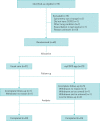Evidence generation for the clinical impact of myCOPD in patients with mild, moderate and newly diagnosed COPD: a randomised controlled trial
- PMID: 33263052
- PMCID: PMC7682704
- DOI: 10.1183/23120541.00460-2020
Evidence generation for the clinical impact of myCOPD in patients with mild, moderate and newly diagnosed COPD: a randomised controlled trial
Abstract
Self-management interventions in COPD aim to improve patients' knowledge, skills and confidence to make correct decisions, thus improving health status and outcomes. myCOPD is a web-based self-management app known to improve inhaler use and exercise capacity in individuals with more severe COPD. We explored the impact of myCOPD in patients with mild-moderate or recently diagnosed COPD through a 12-week, open-label, parallel-group, randomised controlled trial of myCOPD compared with usual care. The co-primary outcomes were between-group differences in mean COPD assessment test (CAT) score at 90 days and critical inhaler errors. Key secondary outcomes were app usage and patient activation measurement (PAM) score. Sixty patients were randomised (29 myCOPD, 31 usual care). Groups were balanced for forced expiratory volume in 1 s (FEV1 % pred) but there was baseline imbalance between groups for exacerbation frequency and CAT score. There was no significant adjusted mean difference in CAT score at study completion, -1.27 (95% CI -4.47-1.92, p=0.44) lower in myCOPD. However, an increase in app use was associated with greater CAT score improvement. The odds of ≥1 critical inhaler error was lower in the myCOPD arm (adjusted OR 0.30 (95% CI 0.09-1.06, p=0.061)). The adjusted odds ratio for being in a higher PAM level at 90 days was 1.65 (95% CI 0.46-5.85) in favour of myCOPD. The small sample size and phenotypic difference between groups limited our ability to demonstrate statistically significant evidence of benefit beyond inhaler technique. However, our findings provide important insights into associations between increased app use and clinically meaningful benefit warranting further study in real world settings.
Copyright ©ERS 2020.
Conflict of interest statement
Conflict of interest: M.G. Crooks has nothing to disclose. Conflict of interest: J. Elkes has nothing to disclose. Conflict of interest: W. Storrar has nothing to disclose. Conflict of interest: K. Roy has nothing to disclose. Conflict of interest: M. North is an employee of mymhealth Limited. He reports grants from SBRI during the conduct of the study and personal fees from mymhealth Limited outside the submitted work. Conflict of interest: A. Blythin reports grants from Innovate UK during the conduct of the study and is an employee of mymhealth Limited. Conflict of interest: A. Watson has nothing to disclose. Conflict of interest: V. Cornelius has nothing to disclose. Conflict of interest: T. Wilkinson is the founder and directior of MyMHealth. He reports grants from Innovate UK during the conduct of the study; and personal fees and other support from MyMHealth, grants from GSK, grants and personal fees from AstraZeneca and Synairgen, and personal fees from BI, outside the submitted work.
Figures



References
-
- Alwan A. Global Status Report on Non-Communicable Diseases. WHO, 2014. https://apps.who.int/iris/bitstream/handle/10665/148114/9789241564854_en... Date last accessed: 26 June 2020.
-
- Snell N, Strachan D, Hubbard R, et al. . S32 Epidemiology of chronic obstructive pulmonary disease (COPD) in the UK: findings from the British Lung Foundation's ‘respiratory health of the nation’ project. Thorax 2016; 71: A20.
-
- NICE guideline [NG115] Chronic obstructive pulmonary disease in over 16s: diagnosis and management. https://www.nice.org.uk/guidance/ng115/resources/chronic-obstructive-pul... Published 5 December 2018. Date last updated: 26 July 2019.
-
- Department of Health. A n outcomes strategy for COPD and asthma: NHS companion document. Impact report, 2012. https://assets.publishing.service.gov.uk/government/uploads/system/uploa...
LinkOut - more resources
Full Text Sources
Medical
Miscellaneous
